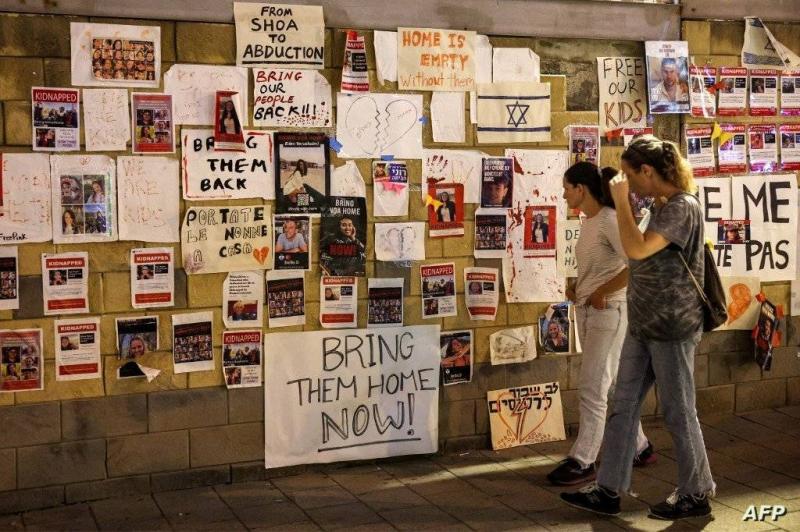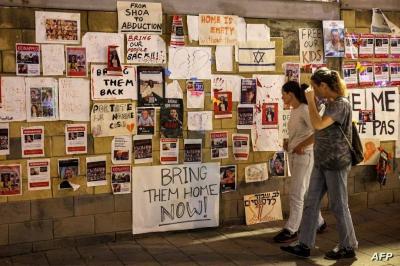As Israel attempts to recover its hostages in Gaza through indirect negotiations with the Islamic Resistance Movement (Hamas) and military operations in the Gaza Strip, it is announcing the in absentia deaths of some missing individuals being held in Gaza. This move aims to assist the anxious relatives of the hostages in closing this chapter. A medical committee consisting of three experts is examining video footage of the attack carried out by Palestinian gunmen led by Hamas fighters in southern Israel, searching for any signs of life-threatening injuries among the abductees and comparing this with testimonies from hostages released during a week-long ceasefire in Gaza that ended on Friday.
Hagar Mizrahi, an official with the Israeli Ministry of Health who heads the committee formed as part of the response to the crisis that has now entered its third month, stated that the video footage could be sufficient to declare death, even if no doctor has officially confirmed this based on a physical examination of the hostage's body. She added in remarks to Israeli public broadcaster KAN Radio, "Declaring death is not easy at all, and certainly not in the situation we are living." She explained that the committee is responding "to the desire of the families of the kidnapped in Gaza to know as much (information) as possible about them."
Of the approximately 240 individuals abducted, Hamas released 108 people in exchange for Israel's release of dozens of Palestinian prisoners, as well as an increase in humanitarian aid shipments to Gaza. Since the end of the ceasefire, Israeli authorities have reported the deaths of seven civilians and a colonel in the military during captivity. Israel claims that 137 are still being held in Gaza, and their condition is often unknown. Hamas has not confirmed this. Earlier, Hamas stated that dozens of hostages were killed in Israeli airstrikes and threatened to execute others, indicating that some hostages are held by other armed Palestinian factions.
The hostages are held isolated from the outside world despite Israeli calls for the Red Cross to visit them and ensure their safety. Mizrahi mentioned that she and her colleagues on the committee, one of whom is a forensic specialist and the other in physical trauma, review footage recorded by Hamas militants themselves and clips captured by Palestinians with their mobile phones as well as surveillance camera footage that observed the hostage-taking, "over and over, shot by shot." This allows them to identify life-threatening wounds and ascertain whether any of the hostages had stopped breathing or showed other vital reactions.
The committee considers other factors, such as the harsh treatment of the hostages by their captors and the limited access to adequate medical care in Gaza, along with death reports from their fellow former hostages. Mizrahi stated that the committee consults with a religious scholar due to Jewish laws that prevent a widow from remarrying unless her husband's death is officially acknowledged. She added, "We are gathering the overall picture," noting that the declaration of death is made by mutual agreement.
The risk of error is evident in the case of Emily Hand, who disappeared on October 7, and whose father Tom was initially informed "unofficially" of her death. However, in reality, the girl was held captive and released during the ceasefire afterward. Nevertheless, the lack of burial for loved ones may pose a psychological barrier for grieving relatives. The Israeli military announced last week the death of Shaked Gal, a soldier missing since October 7. The army has rabbinical and intelligence units combing the battlefields in Gaza to gather information about the fate of missing soldiers as well as the remains of the hostages. Sigalit, Shaked's mother, posted on Facebook directed to her 19-year-old son that she would not enter a mourning period "until his body returns." Mizrahi indicated that the committee had not yet met with any family rejecting the acceptance of a death declaration but is prepared for such a situation. She added, "We are here to provide the professional side. We do not argue with families or confront them about their decision; we accept their choices with understanding." The army has recovered the bodies of an Israeli female soldier who was captive and two civilian hostages, and has released a female soldier in a rescue operation.




